“I thought you’d want to know, Susan.” Something in her tone made me stop putting away laundry, clutch my cell phone, and drop quickly to the edge of the bed. “They’re tearing the big barn down.”
I didn’t want to know.
I wanted to imagine that everything was still the way it used to be. Now I couldn’t. My imagination would only conjure up a team of men dismantling, board by board, the big barn that had been such a part of my family since 1947 when my newlywed parents moved into the vacant farmhouse.
“Thanks for letting me know. It had to happen someday,” I managed in a calm voice. We said our goodbyes but I couldn’t move.
First we lost Dad, then Mom, then had an auction, then sold the farm. I’d been dealing with it, trying to move on. But now the big barn was coming down and it was triggering all the pain again. Waves of sorrow and regret were drowning me, dragging me deeper and deeper.
Come on, get a grip, it’s just a barn.
I would guess that the main floor pens would be dismantled first. I imagined men with pry bars, tearing the thick native lumber into splinters, prying apart the pens that were crafted, strong as iron, by my Dad. Thousand pound sows hadn’t been able to budge them. I played with piglets in every one of those pens, years ago.
* * *
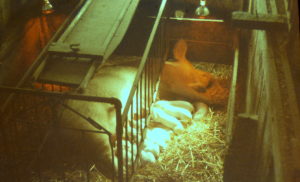
Sow in temporary birthing crate with piglets, Roadhouse barn, 1960’s
Mom had said I could come out to the barn when I finished my colouring homework, if I bundled up, but I had to be very, very quiet. It was a cold February evening. Both Mom and Dad were already there when I lifted the latch and swung the heavy plank door open. I stood and soaked it in. The barn was alive with sights, sounds, smells but everything was soft, muted, and cozy. Heat lamps filled the barn with a rosy glow, keeping the chill away. Sows grunted rhythmically, small feet rustled in deep straw, tiny new piglets squeaked, soft music played from an old dusty radio. I walked quietly, peeking into each pen – five expectant sows waited, three already in labour.
Mom ushered me into a pen where we sat on a bale of straw. Her patient, lying flat on her side in a birthing crate, had seven piglets already. I waited, watched, and learned with Mom. Those vigils were magical times, in a magical barn.
* * *
But it’s just a barn, isn’t it, with old hand-made pigpens? Still a faded white from the days when my parents cleaned and sanitized with whitewash each summer.
* * *
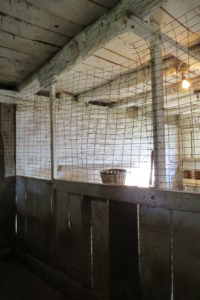
Inside the big barn- Dad converted some pigpens to a chicken pen but you can still see the faded whitewash on the ceiling and walls. 2015
Mom, with a colourful plaid scarf over her hair, armed with a straw broom, smiles, and giggles, battled the big barn’s cobwebs. A year’s worth of dirt and spider webs draped in every corner, by every beam, at every window. Dust hung in the air, dancing in sunbeams that snuck in through south windows. I wandered around with a broom too, exclaiming when very large spiders suddenly popped into view.
The last batch of piglets for the year had been weaned and moved to the next barn. Now was the time to renew and refresh. All the doors and windows were wide open. The concrete floors were clean except for a white powder sprinkled to dry the moisture.
When the air cleared, white washing began. My parents worked as a team, cleaning and disinfecting every wall, pen, and beamed ceiling with enthusiasm, getting ready for next year’s piglets. The fresh white made the barn bright and welcoming. Who would have thought cleaning could be such an adventure?
* * *
But it was just an old barn – and I knew every square inch.
Next those dismantlers would start on the barn board siding. It was silver grey with a vague hint of the red it used to be. I wonder if they’ll notice the scraped boards around the east door.
* * *
I was on my own, but I could do this. Dad had said I could. Good experience for when I’d take my driving test in a few years.
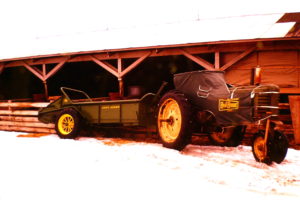
Late 1950’s – Dad using the new manure spreader at the pole barn.
I started the old John Deere B tractor, hitched up the two-wheeled manure spreader, and drove alongside the open barn door. Back and forth, back and forth I maneuvered, trying to get the spreader as close to the doorway as I could. The back end seemed to have a mind of its own. I could hear and feel something catch! A sharp metal edge had dug into the barn boards, leaving a scar. But no one was there to gasp and chuckle at my attempts.
Finally I was satisfied and went to work cleaning out manure. Forkful after forkful landed in the old spreader until it heaped and threatened to roll off the sides. It was time to spread the load on the wheat stubble.
Starting the tractor I followed the marks to where the last load had ended, since you can’t put it all in one place. I wrestled with the levers until it was set the way Dad had shown me, then let out the clutch. The chains in the bed of the spreader and the beaters at the back threw fragrant chunks backwards and to the sides. When the spreader was empty I disengaged the levers and chugged back to the barn to start over.
By the end of the afternoon I proudly surveyed the pens I had cleaned and spread, all by myself. If I could do that, I figured I could do just about anything.
* * *
But it was just a barn – with gouged and scraped siding by the east door. Nothing special, right?
After the barn board is off, the workmen will head to the roof. Long way up, three stories high, crowned with a beam sporting the tattered remnants of an old thick rope. It had been originally used somehow to carry huge clumps of loose hay up to the mow but us kids used it in a different way.
* * *
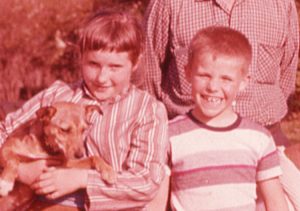
Pat and Michael Dittus
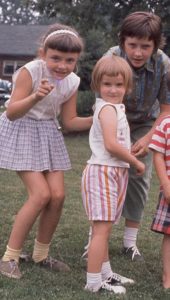
Valerie Dittus, Susan and my sister Pat
Blonde curls fluttered as Michael swung on the old rope, bellowing like Tarzan before diving into a pile of straw. He flailed dramatically then jumped up with a wide grin, “Come on, try it!” His voice echoed in the haymow, against walls of baled hay and straw, up to where the rope was wound and knotted on a huge beam that ran end to end many feet above us.
“My turn! My turn!” Pat, Valerie, and I waited in line while Michael waded back through the deep mat of straw. I held back but pretended not to be afraid, watching the wild leaps of my sister and cousins again and again. I wanted to try but I didn’t want to let go of the rope and fall, so I kept slipping to the back of the line, small and easily overlooked. Finally they caught on.
“Come on, Susan, you can do it,” they said and gently swung me out and I dropped onto the fluffy straw. It didn’t hurt, it was fun!
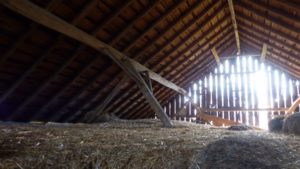
The big barn’s empty haymow, 2015
The rope swung back and forth all afternoon to the rhythm of giggling children, brave leaps, and gurgling Tarzan bellows. Even then it was old and worn, soft and supple in our young hands.
* * *
It wasn’t just a barn.
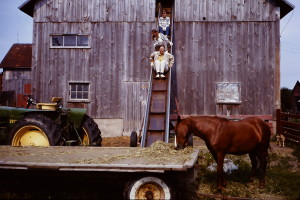
Finished loading bales into the mow, 1969
The hours spent in that big barn helped to shape me – watching new life come into the world, nurturing animals, pushing myself to new limits, learning and working together with family – sweating, laughing, accomplishing. Precious times.
Change is not easy. Waves of grief will always wash over me, but less often than before. As long as I have memories, my dear family and the big old barn will always be there. I can deal with that – until the next phone call.
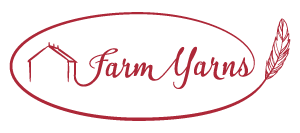
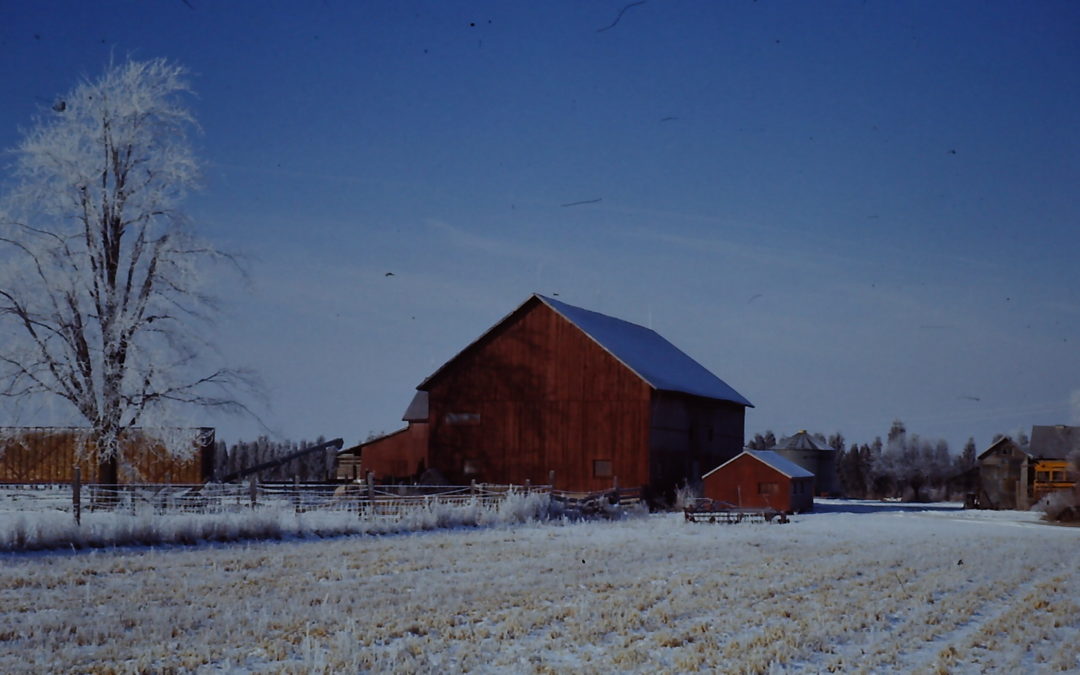

Great story Susan.
Thank you very much. I could have included so many bits and pieces from my memories, but I’ll save them for later.
Enjoyed the story Sue!
Thank you, Al, I’m so pleased that you liked the Big Barn story. It really was a special place to me.
Those of us raised on a farm have fond memories of the barn, but you make yours sound like the best barn ever!
Thanks Jerry! I know you have great barn stories too! A barn full of animals is like a treasure chest, for young kids and for the young at heart.